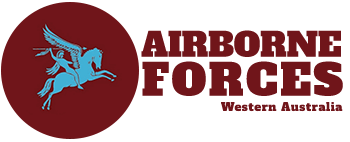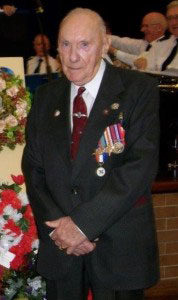Albert Willday was born in Moira, Leicestershire, UK. He left school at the age of 14 to work with his father at a local Pipe Factory.
On 12th July 1942, Albert was called to the colours of The Kings Own Scottish Borderers. In October 1942 he saw initial war time service patrolling the coastline of the Shetland Islands, Scotland as part of the UKs defence against potential German Army invasion from Norway, just 80 miles away across the North Sea.
In 1943 Albert moved south to Lincolnshire and then on to Oxfordshire to commence Airborne Glider training with the 1st Airborne Division.
During his training Albert reported having visits from Field Marshall Montgomery, Prime Minister Churchill and His Majesty, King George VI. He wrote, “at the parade I never felt prouder than that day when the pipes and drums for our Battalion were playing our march past and we marched past with the air filled with the haunting tune by Sir Walter Scott, Blue Bonnets over the Border.”
At 13:00hrs on the 17th September 1944 Albert landed in Arnhem aboard the second glider as part of the 1st Airborne Division. Amidst a hostile field of battle, he and the men around him disabled a number of enemy Anti-Aircraft batteries, taking 40 German prisoners. Having held their positions for 7 days under constant attack, food, water and ammunition exhausted, Albert and the men around him were taken prisoner of war by the Germans. Over the coming weeks Albert and his comrades were moved through Germany staying in various Stalag POW Camps along the way ending up in Stalag 4 D near the eastern German town of Annaburg. Here they were put to work in a Salt Mine near Leipzig.
Albert was liberated by American Forces on the 14th April 1945 and repatriated back to England. At the conclusion of his Military Service on 6th December 1946 Albert proposed and later married Gladys, the woman who was to become his lifelong partner, friend and soul mate.
In 1954 Albert sailed to Fremantle Western Australia with his now wife Gladys, mother May and daughter Dawn. Albert worked as a Clay worker initially living with his mother in Como, Perth before building his family home in Lathlain, Perth. Albert worked for the nearby clay pipe and tile company Bristile for 30 years retiring in 1984.
Albert remained an active member of Airborne Forces Association Western Australia until he was no longer able. He remained in contact with our Association member’s right up until his death on 7th November 2020, the eve of our Remembrance Sunday Service of this year.
Albert’s funeral was conducted at Star Street Uniting Church Carlisle, Perth. The Association were in attendance at the invitation of Alberts loving family. We provided a Guard of Honour for Albert and our Piper Dave Carr Played Blue Bonnets over the Border, the Regimental Quick March of the Kings Own Scottish Borderers.
A nobleman, a gentleman and a legend who set the bar and inspired many generations of Airborne Soldiers to come.
After many briefings to drop at various places in Europe, we were flown to Blake Hill Farm Nr Swindon to be briefed for the Arnhem “Market Garden Operations” for Sunday 17th September, 1944 at 10am.
We landed in Anrhem at 1.05pm on Sunday amongst heavy flak. Our piper played “Blue Bonnets Over the Border”.
We soon had taken forty prisoners from the Ack Ack Division. Earlier met the head of the Dutch underground and all was going to play until later that night we heard a lot of small arms fire and tanks which we thought were coming to relieve us.
We were mistaken and by morning we were under heavy fire from two Tank Divisions and SS Troops. This continued for 5 days and the Platoon was split and there were only 12 of us. A man from 10th Para came and said they were cut off, but markers were to be put out and all were to try to make our way to the Rhine at dusk.
Before we could move, a German SS Officer stood up and said “look around comrades, you’re surrounded”.
We were taken and put into cattle wagons – 50 per wagon and travelled 5 days and 5 nights and arrived in East Germany – Teutschenthel – Stalag IV D.
I was put to work in a salt mine and had very bad ear infections.
Food consisted of a bowl of carrot soup and 300 grams of black bread per day.
The guards left before the American tanks drove through the camp in April, 1944.

